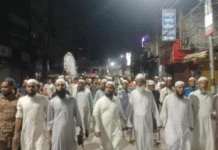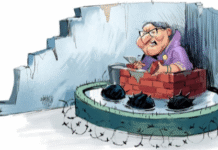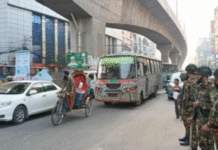The constantly evolving narcotics rackets in Cox’s Bazar have been opening up new fronts to smuggle yaba pills into Bangladesh from Myanmar, largely avoiding Teknaf due to increased vigilance by law enforcers there.
These include establishing new routes, using Rohingyas more than locals as carriers, and trading in the easily recognisable bright red yaba tablets for more nondescript white pills to ensure a continuous inflow of the mad drug.
The new route for smuggling the drug into Bangladesh is through Ghumdhum border point in Naikhyangchhari upazila of Bandarban district.
The rackets based in Cox’s Bazar and Bandarban receive yaba consignments from Rohingyas living in the bordering areas of Myanmar.
From there, the pills speed to various districts, including Dhaka, using three different routes. Rohingyas, some of whom have been living in Cox’s Bazar since 1990, play a role in sending these consignments to different destinations in the country.
Sources said smugglers have almost stopped using Teknaf due to intense vigilance of several law enforcement agencies there.
The rackets have also brought changes to the colour of the yaba pills. Now they are mainly smuggling in white pills, locally called “pepey” (papaya), sources told The Daily Star.
NEW YABA ROUTES
According to local and law enforcement sources, 80 percent of yaba pills are now entering Bangladesh through Naikhyangchhari, 10 percent through different points of Teknaf, and the rest 10 percent via the Indian border.
The yaba pills are transported from Dekibunia — a locality under Maungdaw city of Rakhine State in Myanmar — to the Tombru border, where it melts into the Rohingya camps on the Myanmar side, situated just beside the zero line along Bangladesh.
From the camps on the other side of the border, yaba enters Bangladesh through the Ghumdhum border point and is sent on to Naikhyangchhari.
As Naikhyangchhari is relatively close to the Rohingya camps in Ukhiya, a large portion — around 70 percent — of the yaba consignments are temporarily stored in those camps and transported to various districts, depending on demand and opportunity, according to local sources with knowledge of the smuggling route.
A portion of the consignments is then sent to Cox’s Bazar Sadar through the hilly areas — the smugglers use Baishari road and Idgar union of Ramu for the journey. The consignments then head to Chattogram via the Cox’s Bazar-Chattogram highway.
Another portion of the consignment reaches Chattogram via Bandarban Sadar.
The rest of the yaba coming in through the southern borders directly enters through three points — Balukhali, Thaingkhali and Palongkhali — in Ukhiya after crossing the Naf river and Rahmater Beel point.
These consignments are also kept inside the Rohingya camps and sent on to different districts later.
Md Hemayetul Islam, commanding officer of Armed Police Battalion (APBn-16), told The Daily Star recently that smugglers consider the camps safe for hiding yaba pills.
“There are thousands of small houses inside the Rohingya camps and all of them look the same. For this reason, it becomes quite difficult to recover or trace the pills unless anyone has specific information,” he said.
“Besides, if any law enforcer tries to enter these small houses in search of yaba without specific information, the Rohingya women often react in a way which is tantamount to an embarrassing situation,” he said without elaborating.
The remaining 10 percent of yaba make its way through India, according to sources.
The consignments first enter the north-eastern Indian state of Mizoram and are transported through other states before reaching border points in Sylhet, Sunamganj, Habiganj, Jashore and Chapainawabganj.
The inflow of yaba remains unstoppable though a massive anti-narco crackdown beginning in May 2018 left nearly 519 people killed in so-called gunfights, 223 of whom were from Cox’s Bazar alone, as of June this year.
During this period, over one lakh people were arrested for their alleged involvement with the narcotics trade. In February last year, there was a “symbolic surrender” and arrest of 102 yaba godfathers and top dealers in Cox’s Bazar.
In an April 2019 investigation by The Daily Star, it was revealed that these arrests did little to hinder the yaba trade — with family members and agents continuing the smuggling on their behalf.
Officials, however, say they have undertaken a zero tolerance policy against narcotics trade and that drives are on to stop this.
Contacted, Alamgir Hossain, officer-in-charge of Naikhyangchhari Police Station, told The Daily Star on September 3 that they beefed up patrolling and deployed additional forces in all those points from where narcotics are smuggled into Bangladesh.
“We have adopted a zero-tolerance policy against narcotics,” he said.
“It may not be possible to bring down narcotics smuggling to zero but we are doing our best and we managed to keep it under control.”
THE NEW PILL
While talking to The Daily Star, a yaba carrier said they are now smuggling in white pills, which have become quite popular now.
“Each of these pills sell inside the Rohingya camps for Tk 50 now. But you have to buy at least one box, containing around 10,000 pills, from the camps to get this rate,” said the carrier.
If anyone tries to buy these pills outside the camps, the wholesale rate is Tk 80 in Teknaf and between Tk 100 and Tk 120 in Cox’s Bazar Sadar.
The carrier, however, failed to give any specific idea of the retail price of the new pill.
Apart from the new white pill, three other types in different shades — R7, WY, and Orange — are also available.
Regarding the rate of these pills, a local source said R7 was available for Tk 40, WY for Tk 30, and Orange for Tk 20.
“You will also get the pills at retail price by adding Tk 20-30 to the existing wholesale price in the district,” said the source.
NEW CARRIERS, SHELTERS
In a new practice, the smugglers are now using some groups in hilly areas as carriers, according to sources and law enforcers.
These remote areas are seven kilometres inside the Idgar union, they said.
For carrying the yaba consignments, smugglers usually pay between Tk 10,000 and Tk 30,000 to the carriers, depending on quantity.
The smugglers do not always transfer the consignments on the same day it reaches Naikhyangchhari.
They often need to hide these consignments for a while and mainly choose the homes of Rohingyas, some of whom have been living in Naikhyangchhari for the last 20 to 30 years.
For keeping yaba consignments for one night, they are often paid between Tk 20,000 to Tk 50,000, depending on quantity.
Bazlur Rahman, a majhi (community leader of a Rohingya camp), said they are taking information of those involved in the narcotics trade and working with law enforcers to take action against them.
Jahangir Kabir Chowdhury, chairman of Rajapalong union parishad, told The Daily Star recently that they have also learned that the smugglers are now mainly using Naikhyangchhari point to smuggle yaba inside Bangladesh.
Contacted, ABM Masud Hossain, superintendent of police of Cox’s Bazar, said they always remain alert for any kind of narcotics smuggling and take action whenever they get any specific information.
[Our Cox’s Bazar correspondent Mohammad Ali Jinnat contributed to the report]










